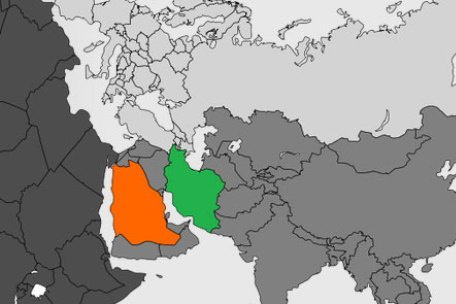Iran Should Negotiate with the West

Despite Iran’s efforts, there have been constant tensions between Iran and Saudi Arabia since the beginning of the Islamic Revolution of Iran. It seems that Saudi Arabia is reluctant to develop close relations with Iran, its unwillingness to return Iranian official visits to Saudi Arabia, an evidence of the Saudis’ reluctance.
Saudi Arabia considers itself as the Big Brother of the Arab countries, particularly of the Sunnis. Conversely, Iran sees itself as the leader of the Shia’ world. As a result, the two countries’ competitive aura is present in any country with Shia/Sunni populations.
Following the US attack on Iraq and the fall of Saddam’s regime, Iran and Saudi Arabia’s rivalry in Iraq created issues between the two countries, and after the American troops’ exit from Iraq the rivalry between the two countries has amplified.
Shadowing the Arab Spring, in Bahrain people rallied against their minority Sunni government, which was responded to by Saudi military intervention. This issue created yet another crisis between Tehran and Riyadh with both sides accusing each other of meddling in Bahrain. Similar issues occur in Syria-- a Sunni majority country that is run by a Shi’a [sic] government.
The recent Saudi allegation of Iran’s attempt to assassinate the Saudi ambassador to the US has increased conflict between the two countries-- to its highest point since the beginning of the Islamic Revolution of Iran. This was followed by Saudi Arabia’s complaint against Iran in the UN. The controversial allegation against Iran soon subsided, however, and in an attempt to “smoothen” relations, the Iranian Intelligence Minister Heydar Moslehi visited Saudi Arabia.
Similarly, in a bid to declare friendliness, the Iranian oil minister responded positively to a Saudi request to increase OPEC oil production. Yet, none of Iran’s efforts were responded to favorably as Saudi Arabia confirmed its hostile position on Iran by attending the conference in Rome on boycotting Iranian oil.
Diplomats from 11 countries, namely the US, Britain, Italy, France, Germany, Japan, Canada, South Korea, Australia and Saudi Arabia, attended this meeting to discuss boycotting Iran’s oil as well as Saudi Arabia’s capability to offset the gap in the market created by Iran’s absence.
Saudi Arabia has currently become the most important supplier of oil in the world. Ali al-Naimi, the Saudi oil minister, announced that his country is ready to compensate for a lack of Iranian oil by increasing oil production to 12 million barrels a day within a few days. The Iranian foreign minister considered these remarks as unfriendly.
Riyadh has become the center of talks regarding Iran’s oil. China’s and Japan’s prime ministers held talks with Saudi officials to ensure the Saudi oil supply. Following these talks, China announced that it is reducing its Iranian oil purchases by half, to 258 thousand barrels a day. Putting this beside China’s new $10 billion dollar agreement with Saudi Arabia last week, Saudi Arabia’s role in Iran sanctions is fully visible.
Tehran’s diplomatic weakness has given Western countries the opportunity to take full advantage of inoperative relations between Iran and Saudi Arabia. Additionally, Riyadh is using the latest developments to further establish its positions in regional dealings as well as in the international community.
Recent debates over Iran have diverted criticism away from the Saudi government’s human right conduct and positioned it as the West’s key ally in the Middle East, despite Saudi Arabia’s disregard for the basics o democracy. Additionally, many believe that Saudi Arabia has benefited the most from recent developments regarding Iran.
Contrary to common belief, Iran’s way out of the recent pressures is not further pursuing friendship with Saudi Arabia, but effective diplomacy with Washington and the European Union.
Yesterday in Istanbul the Iranian foreign minister welcomed further talks with the P5+1. Iran should seriously avoid making threatening remarks and demonstrate its willingness in keeping the region and the Strait of Hormuz stable. This way it can distance itself from the current crisis in relations with the West. Otherwise, there are many countries ready to exploit Iran’s foreign affairs crisis.

